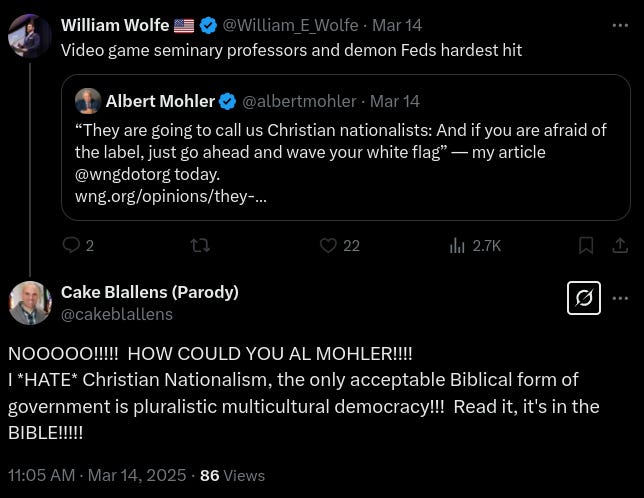"Raca"
Most “anons” (anonymous social media accounts), even the ones whose causes I agree with, are run by people using their anonymity as a license to treat others in ways they would be ashamed of if done under their real identity. Most of them would likely insist that this assessment is unfair, but I have spent far too much time on social media observing their behavior to be swayed by their protestations, especially since many of those protestations would consist of calling me “fake and ghey.” We have normalized the creation of pseudonymous identities for the purpose of attaining an antisocial catharsis. Far too many of our fellow human beings have an app on their phone that they use as a daily Two Minutes Hate. I know this, because I often serve as their Emmanuel Goldstein.
Above is a meme made about theologian Owen Strachan and me, after Strachan referenced my book in a speech warning of white nationalism infiltrating evangelicalism through the Christian Nationalist movement, at the 2023 G3 conference. Though, at the time, he claimed the argument was a strawman, this anon is now promoting open neo-Nazis, like Samuel Holden, who makes videos with spliced in 1930s Nazi propaganda.
Here, one of the more mentally unwell Christian Nationalist anons, whom I know in real life to be a man in his mid-fifties from Montana, posts an AI generated video of a meme he created, portraying me as one of his favorite insults, “Demon Fed,” which has also been flung at me multiple times by American Reformer’s William Wolfe. The impetus for this was that I objected to Founders Ministries President Tom Ascol using biblical Greek to revile a professed Christian over a political disagreement. This anon is also openly kinist (a term for Christianized white nationalism), again using AI to create a song and accompanying music video, titled “It ain’t sin to love your kin.”

Most will see these as extreme examples, but if you’re using an anonymous account to fling personal insults at anyone at all—let alone if you’re a Christian who has been expressly told not to conduct yourself in that way—isn’t “extreme” wholly subjective? If you wouldn’t say it to someone face-to-face in the real world, why create an alternate identity to do it in the digital world? I assure you that there is nothing you’re saying, hiding behind an avatar, that is so important to communicate that you wouldn’t be better off keeping that opinion to yourself and finding more important things to focus your mental energy on.
I’ve become wholly acclimatized to being reviled, and the people who revile me are the most unethical people imaginable, using “Christianity” as a cultural marker while they drag the name of Jesus Christ through the mud, but it wasn’t always so easy to shrug it off. The first few times it happened, as someone who had been off social media altogether for half a decade, it really affected me. It can be acceptable to use aggressive words to describe someone’s behavior—you can say someone’s being a “jerk”—but when you call someone a “clown,” “demon,” or “malakoi,” words that instead bypass the actual behavior to attack the person, you are committing a sinful spiritual attack. You are labeling them as “less than” yourself; you are diminishing their status as an image bearer. You are ensuring that they will forever see you as someone who hates not just their behavior, but them personally. There are very few anons, no matter their stated beliefs or what cause they claim to champion, whom I haven’t seen engage in that type of derision, at one point or another. It’s time for us to stop treating it as acceptable on “Christian” social media.



